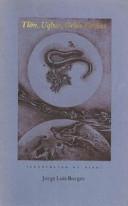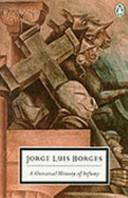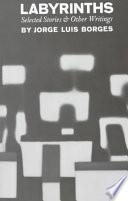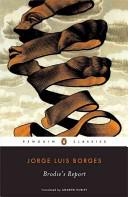Works
Other Inquisitions
Jorge Luis Borges
Ficciones
Jorge Luis Borges
Tlön, Uqbar, Orbis Tertius
Jorge Luis Borges
Dreamtigers
Jorge Luis BorgesThe Library of Babel
Jorge Luis BorgesThe Theologians
Jorge Luis BorgesThe Analytical Language of John Wilkins
Jorge Luis BorgesThe Immortal
Jorge Luis BorgesEvaristo Carriego: A Book About Old-Time Buenos Aires
Jorge Luis BorgesOn Exactitude in Science
Jorge Luis BorgesThe Approach to Al-Mu'tasim
Jorge Luis Borges
Seven Nights
Jorge Luis Borges
A Universal History of Infamy
Jorge Luis BorgesThe Other
Jorge Luis BorgesThe Man on the Threshold
Jorge Luis BorgesLuna De Enfrente
Jorge Luis Borges
Labyrinths
Jorge Luis BorgesTom Castro, the Implausible Imposter
Jorge Luis BorgesDeutsches Requiem
Jorge Luis Borges
Brodie's Report
Jorge Luis BorgesFamous Jorge Luis Borges Quotes
“Being with you and not being with you is the only way I have to measure time.”
"The Threatened", The Book of Sand [El Libro de arena] (1975)
“To fall in love is to create a religion that has a fallible god.”
"The Meeting in a Dream"
Other Inquisitions (1952)
No estoy seguro de que yo exista, en realidad. Soy todos los autores que he leído, toda la gente que he conocido, todas las mujeres que he amado. Todas las ciudades que he visitado, todos mis antepasados...
Source: El Pais, 1981 http://elpais.com/diario/1981/09/26/ultima/370303206_850215.html; translation: The Guardian, 2008 http://www.theguardian.com/books/2008/jun/10/jorgeluisborges
Jorge Luis Borges Quotes about time
Source: The Book of Sand and Shakespeare's Memory
"Juan Muraña", in Brodie's Report (1970); tr. Andrew Hurley, Collected Fictions (1998)
"A New Refutation of Time" (1946) [" Nueva refutación del tiempo http://www.monografias.com/trabajos11/filoylit/filoylit.shtml"]
Variant translations:
And yet, and yet... Denying temporal succession, denying the self, denying the astronomical universe, are obvious acts of desperation and secret consolation. Our fate (unlike the hell of Swedenborg or the hell of Tibetan mythology) is not frightful because it is unreal; it is frightful because it is irreversible and ironclad. Time is the thing I am made of. Time is a river that sweeps me along, but I am the river; it is a tiger that tears me apart, but I am the tiger; it is a fire that consumes me, but I am the fire. The world, unfortunately, is real; I, unfortunately, am Borges.
Time is the substance from which I am made. Time is a river which carries me along, but I am the river; it is a tiger that devours me, but I am the tiger; it is a fire that consumes me, but I am the fire.
Other Inquisitions (1952)
Source: Labyrinths: Selected Stories and Other Writings
Context: Time is the substance I am made of. Time is a river which sweeps me along, but I am the river; it is a tiger which destroys me, but I am the tiger; it is a fire which consumes me, but I am the fire. The world, unfortunately, is real; I, unfortunately, am Borges.
Context: And yet, and yet... Denying temporal succession, denying the self, denying the astronomical universe, are apparent desperations and secret consolations. Our destiny is not frightful by being unreal; it is frightful because it is irreversible and iron-clad. Time is the substance I am made of. Time is a river which sweeps me along, but I am the river; it is a tiger which destroys me, but I am the tiger; it is a fire which consumes me, but I am the fire. The world, unfortunately, is real; I, unfortunately, am Borges.
Tlön, Uqbar, Orbis Tertius (1940)
Jorge Luis Borges Quotes about space
“We are as ignorant of the meaning of the dragon as we are of the meaning of the universe.”
Source: The Book of Imaginary Beings
"Gauchesque Poetry"
Discussion (1932)
Para uno de esos gnosticos, el visible universo era una ilusion o (mas precisamente) un sofisma. Los espejos y la paternidad son abominables porque lo multiplican y lo divulgan.
Tlön, Uqbar, Orbis Tertius (1940)
Cabe ir más lejos; cabe sospechar que no hay universo en el sentido orgánico, unificador, que tiene esa ambiciosa palabra. Si lo hay, falta conjeturar su propósito; falta conjeturar las palabras, las definiciones, las etimologías, las sinonimias, del secreto diccionario de Dios.
As translated by Lilia Graciela Vázquez
Other Inquisitions (1952), The Analytical Language of John Wilkins
Variant: We can go further; we suspect that there is no universe in the organic, unifying sense of that ambitious word. If there is, we must conjecture its purpose; we must conjecture the words, the definitions, the etymologies, the synonyms, from the secret dictionary of God.
Tlön, Uqbar, Orbis Tertius (1940)
Variant: This happy conjecture affirmed that there is only one subject, that this indivisible subject is every being in the universe and that these beings are the organs and masks of the divinity.
Jorge Luis Borges: Trending quotes
"The Argentine Writer and Tradition", Fervor of Buenos Aires (1923)
Context: Some days past I have found a curious confirmation of the fact that what is truly native can and often does dispense with local color; I found this confirmation in Gibbon's Decline and Fall of the Roman Empire. Gibbon observes that in the Arabian book par excellence, in the Koran, there are no camels; I believe if there were any doubt as to the authenticity of the Koran, this absence of camels would be sufficient to prove it is an Arabian work. It was written by Mohammed, and Mohammed, as an Arab, had no reason to know that camels were especially Arabian; for him they were part of reality, he had no reason to emphasize them; on the other hand, the first thing a falsifier, a tourist, an Arab nationalist would do is have a surfeit of camels, caravans of camels, on every page; but Mohammed, as an Arab, was unconcerned: he knew he could be an Arab without camels. I think we Argentines can emulate Mohammed, can believe in the possibility of being Argentine without abounding in local color.
Jorge Luis Borges Quotes
Book of Imaginary Beings (1957), as translated by Norman Thomas di Giovanni
Context: It is universally held that the unicorn is a supernatural being and of auspicious omen; so say the odes, the annals, the biographies of worthies, and other texts whose authority is unimpeachable. Even village women and children know that the unicorn is a lucky sign. But this animal does not figure among the barnyard animals, it is not always easy to come across, it does not lend itself to zoological classification. Nor is it like the horse or bull, the wolf or deer. In such circumstances we may be face to face with a unicorn and not know for sure that we are. We know that a certain animal with a mane is a horse and that a certain animal with horns is a bull. We do not know what the unicorn looks like.
“Truly fine poetry must be read aloud.”
"The Divine Comedy" (1977)
Context: Truly fine poetry must be read aloud. A good poem does not allow itself to be read in a low voice or silently. If we can read it silently, it is not a valid poem: a poem demands pronunciation. Poetry always remembers that it was an oral art before it was a written art. It remembers that it was first song.
“The mightiest love was granted him
Love that does not expect to be loved.”
"Baruch Spinoza", as translated in Spinoza and Other Heretics: The Marrano of Reason (1989) by Yirmiyahu Yovel
Context: Time carries him as the river carries
A leaf in the downstream water.
No matter. The enchanted one insists
And shapes God with delicate geometry.
Since his illness, since his birth,
He goes on constructing God with the word.
The mightiest love was granted him
Love that does not expect to be loved.
Tlön, Uqbar, Orbis Tertius (1940)
Context: Who are the inventors of Tlön? The plural is inevitable, because the hypothesis of a lone inventor — an infinite Leibniz laboring away darkly and modestly — has been unanimously discounted. It is conjectured that this brave new world is the work of a secret society of astronomers, biologists, engineers, metaphysicians, poets, chemists, algebraists, moralists, painters, geometers... directed by an obscure man of genius. Individuals mastering these diverse disciplines are abundant, but not so those capable of inventiveness and less so those capable of subordinating that inventiveness to a rigorous and systematic plan. This plan is so vast that each writer's contribution is infinitesimal. At first it was believed that Tlön was a mere chaos, and irresponsible license of the imagination; now it is known that it is a cosmos and that the intimate laws which govern it have been formulated, at least provisionally. Let it suffice for me to recall that the apparent contradictions of the Eleventh Volume are the fundamental basis for the proof that the other volumes exist, so lucid and exact is the order observed in it.
"Death and the Compass"
Ficciones (1944)
Context: "It's possible, but not interesting," Lonnrot answered. "You will reply that reality hasn't the slightest need to be of interest. And I'll answer you that reality may avoid the obligation to be interesting, but that hypotheses may not. In the hypothesis you have postulated, chance intervenes largely. Here lies a dead rabbi; I should prefer a purely rabbinical explanation; not the imaginary mischances of an imaginary robber."
Other Inquisitions (1952), The Modesty of History
Context: Only one thing is more admirable than the admirable reply of the Saxon king: that an Icelander, a man of the lineage of the vanquished, has perpetuated the reply. It is as if a Carthaginian had bequeathed to us the memory of the exploit of Regulus. Saxo Grammaticus wrote with justification in his Gesta Danorum: "The men of Thule [Iceland] are very fond of learning and of recording the history of all peoples and they are equally pleased to reveal the excellences of others or of themselves."
Not the day when the Saxon said the words, but the day when an enemy perpetuated them, was the historic date. A date that is a prophecy of something still in the future: the day when races and nations will be cast into oblivion, and the solidarity of all mankind will be established.
Tlön, Uqbar, Orbis Tertius (1940)
Context: Hume noted for all time that Berkeley's arguments did not admit the slightest refutation nor did they cause the slightest conviction. This dictum is entirely correct in its application to the earth, but entirely false in Tlön. The nations of this planet are congenitally idealist. Their language and the derivations of their language — religion, letters, metaphysics — all presuppose idealism. The world for them is not a concourse of objects in space; it is a heterogeneous series of independent acts. It is successive and temporal, not spatial.
“What one man does is something done, in some measure, by all men.”
"The Form of the Sword"
Ficciones (1944)
Context: What one man does is something done, in some measure, by all men. For that reason a disobedience committed in a garden contaminates the human race; for that reason it is not unjust that the crucifixion of a single Jew suffices to save it.
As translated by Lilia Graciela Vázquez
Variant: The impossibility of penetrating the divine scheme of the universe does not, however, dissuade us from planning human schemes, even though we know they must be provisional. The Analytic Language of Wilkins is not the least admirable of these schemes.
As translated by Will Fitzgerald
Other Inquisitions (1952), The Analytical Language of John Wilkins
Context: The impossibility of penetrating the divine pattern of the universe cannot stop us from planning human patterns, even though we are conscious they are not definitive. The analytic language of Wilkins is not the least admirable of such patterns.
“If Dahlmann was without hope, he was also without fear.”
"The South"
Ficciones (1944)
Context: If Dahlmann was without hope, he was also without fear. As he crossed the threshold, he felt that to die in a knife fight, under the open sky, and going forward to the attack, would have been a liberation, a joy, and a festive occasion, on the first night in the sanitarium, when they stuck him with the needle. He felt that if he had been able to choose, then, or to dream his death, this would have been the death he would have chosen or dreamt. Firmly clutching his knife, which he perhaps would not know how to wield, Dahlmann went out into the plain.
"Poetry" (the fifth of Borges' seven conferences of 1977 in Teatro Coliseo, in Buenos Aires, later corrected and published in 1980 as a book, Siete noches/Seven Nights) (blog about Jorge Luis Borges (in Spanish) http://argentinaexchange.com/blog/?p=5296
Context: The aesthetic event is something as evident, as immediate, as indefinable as love, the taste of fruit, of water. We feel poetry as we feel the closeness of a woman, or as we feel a mountain or a bay. If we feel it immediately, why dilute it with other words, which no doubt will be weaker than our feelings?
“The poverty of yesterday was less squalid than the poverty we purchase with our industry today.”
"The Elderly Lady", in Brodie's Report (1970); tr. Andrew Hurley, Collected Fictions (1998)
Context: The poverty of yesterday was less squalid than the poverty we purchase with our industry today. Fortunes were smaller then as well.
On Exactitude in Science, as translated by Andrew Hurley, in Jorge Luis Borges, Collected Fictions (1999); first published in Los Anales de Buenos Aires, año 1, no. 3 (March 1946)
Tlön, Uqbar, Orbis Tertius (1940)
Context: Hume noted for all time that Berkeley's arguments did not admit the slightest refutation nor did they cause the slightest conviction. This dictum is entirely correct in its application to the earth, but entirely false in Tlön. The nations of this planet are congenitally idealist. Their language and the derivations of their language — religion, letters, metaphysics — all presuppose idealism. The world for them is not a concourse of objects in space; it is a heterogeneous series of independent acts. It is successive and temporal, not spatial.
Variants: One of the schools in Tlön has reached the point of denying time. It reasons that the present is undefined, that the future has no other reality than as present hope, that past is no more than present memory . . . Another maintains that the universe is comparable to those code systems in which not all the symbols have meaning, and in which only that which happens every three hundredth night is true...
The history of the universe... is the handwriting produced by a minor god in order to communicate with a demon.
Tlön, Uqbar, Orbis Tertius (1940)
Context: One of the schools of Tlön goes so far as to negate time; it reasons that the present is indefinite, that the future has no reality other than as a present hope, that the past has no reality other than as a present memory. Another school declares that all time has already transpired and that our life is only the crepuscular and no doubt falsified an mutilated memory or reflection of an irrecoverable process. Another, that the history of the universe — and in it our lives and the most tenuous detail of our lives — is the scripture produced by a subordinate god in order to communicate with a demon. Another, that the universe is comparable to those cryptographs in which not all the symbols are valid and that only what happens every three hundred nights is true. Another, that while we sleep here, we are awake elsewhere and that in this way every man is two men.
"The Argentine Writer and Tradition", Fervor of Buenos Aires (1923)
Context: Some days past I have found a curious confirmation of the fact that what is truly native can and often does dispense with local color; I found this confirmation in Gibbon's Decline and Fall of the Roman Empire. Gibbon observes that in the Arabian book par excellence, in the Koran, there are no camels; I believe if there were any doubt as to the authenticity of the Koran, this absence of camels would be sufficient to prove it is an Arabian work. It was written by Mohammed, and Mohammed, as an Arab, had no reason to know that camels were especially Arabian; for him they were part of reality, he had no reason to emphasize them; on the other hand, the first thing a falsifier, a tourist, an Arab nationalist would do is have a surfeit of camels, caravans of camels, on every page; but Mohammed, as an Arab, was unconcerned: he knew he could be an Arab without camels. I think we Argentines can emulate Mohammed, can believe in the possibility of being Argentine without abounding in local color.
The Garden of Forking Paths (1942), The Garden of Forking Paths
Context: Ts'ui Pe must have said once: I am withdrawing to write a book. And another time: I am withdrawing to construct a labyrinth. Every one imagined two works; to no one did it occur that the book and the maze were one and the same thing.
"A Conversation With Jorge Luis Borges" http://www.wooster.edu/artfuldodge/interviews/borges.htm, Artful Dodge (April 1980)
Context: As I think of the many myths, there is one that is very harmful, and that is the myth of countries. I mean, why should I think of myself as being an Argentine, and not a Chilean, and not an Uruguayan. I don't know really. All of those myths that we impose on ourselves — and they make for hatred, for war, for enmity — are very harmful. Well, I suppose in the long run, governments and countries will die out and we'll be just, well, cosmopolitans.
"Kafka and His Precursors" ["Kafka y sus precursores"], as translated in Labyrinths (1964)
Variant translation: The fact is that all writers create their precursors. Their work modifies our conception of the past, just as it is bound to modify the future.
Other Inquisitions (1952)
Context: In the critic's vocabulary, the word "precursor" is indispensable, but it should be cleansed of all connotations of polemic or rivalry. The fact is that every writer creates his own precursors. His work modifies our conception of the past, as it will modify the future.
Variant translation: This web of time — the strands of which approach one another, bifurcate, intersect or ignore each other through the centuries — embrace every possibility.
The Garden of Forking Paths (1942), The Garden of Forking Paths
Context: The Garden of Forking Paths is an incomplete, but not false, image of the universe as Ts'ui Pên conceived it. In contrast to Newton and Schopenhauer, your ancestor did not believe in a uniform, absolute time. He believed in an infinite series of times, in a growing, dizzying net of divergent, convergent and parallel times. This network of times which approached one another, forked, broke off, or were unaware of one another for centuries, embraces all possibilities of time. We do not exist in the majority of these times; in some you exist, and not I; in others I, and not you; in others, both of us.
A Universal History of Iniquity, preface to the 1954 edition; tr. Andrew Hurley, Collected Fictions (1998)
Context: I would define the baroque as that style that deliberately exhausts (or tries to exhaust) its own possibilities, and that borders on self-caricature. [... ] The baroque is the final stage in all art, when art flaunts and squanders its resources.
“We do not know what the unicorn looks like.”
Book of Imaginary Beings (1957), as translated by Norman Thomas di Giovanni
Context: It is universally held that the unicorn is a supernatural being and of auspicious omen; so say the odes, the annals, the biographies of worthies, and other texts whose authority is unimpeachable. Even village women and children know that the unicorn is a lucky sign. But this animal does not figure among the barnyard animals, it is not always easy to come across, it does not lend itself to zoological classification. Nor is it like the horse or bull, the wolf or deer. In such circumstances we may be face to face with a unicorn and not know for sure that we are. We know that a certain animal with a mane is a horse and that a certain animal with horns is a bull. We do not know what the unicorn looks like.
"Baruch Spinoza", as translated in Spinoza and Other Heretics: The Marrano of Reason (1989) by Yirmiyahu Yovel
Context: Time carries him as the river carries
A leaf in the downstream water.
No matter. The enchanted one insists
And shapes God with delicate geometry.
Since his illness, since his birth,
He goes on constructing God with the word.
The mightiest love was granted him
Love that does not expect to be loved.
Discussion (1932)
Context: It is venturesome to think that a coordination of words (philosophies are nothing more than that) can resemble the universe very much. It is also venturesome to think that of all these illustrious coordinations, one of them — at least in an infinitesimal way — does not resemble the universe a bit more than the others.
Tlön, Uqbar, Orbis Tertius (1940)
Context: The metaphysicians of Tlön do not seek for the truth or even for verisimilitude, but rather for the astounding. They judge that metaphysics is a branch of fantastic literature. They know that a system is nothing more than the subordination of all aspects of the universe to any one such aspect. Even the phrase "all aspects" is rejectable, for it supposes the impossible addition of the present and of all past moments.
On Exactitude in Science, as translated by Andrew Hurley, in Jorge Luis Borges, Collected Fictions (1999); first published in Los Anales de Buenos Aires, año 1, no. 3 (March 1946)
Context: In that Empire, the Art of Cartography attained such Perfection that the map of a single Province occupied the entirety of a City, and the map of the Empire, the entirety of a Province. In time, those Unconscionable Maps no longer satisfied, and the Cartographers Guilds struck a Map of the Empire whose size was that of the Empire, and which coincided point for point with it. The following Generations, who were not so fond of the Study of Cartography as their Forebears had been, saw that that vast Map was Useless, and not without some Pitilessness was it, that they delivered it up to the Inclemencies of Sun and Winters. In the Deserts of the West, still today, there are Tattered Ruins of that Map, inhabited by Animals and Beggars; in all the Land there is no other Relic of the Disciplines of Geography.<!
Cada vez que leo algo que han escrito contra mi, no sólo comparto el sentimiento sino que pienso que yo mismo podría hacer mejor el trabajo, quizá debería aconsejar a los aspirantes a enemigos que me envíen sus criticas de antemano, con la seguridad de que recibirán toda mi ayuda y mi apoyo. Hasta he deseado secretamente escribir con seudónimo, una larga invectiva contra mí mismo.
"Jorge Luis Borges visto por él mismo" http://www.diariomedico.com/entorno/ent271299com.html (Jorge Luis Borges seen by himself) In the case of this work, the Spanish version seems to have been published after the English version.
Autobiographical Notes (1970)
Context: Any time something is written against me, I not only share the sentiment but feel I could do the job far better myself. Perhaps I should advise would-be enemies to send me their grievances beforehand, with full assurance that they will receive my every aid and support. I have even secretly longed to write, under a pen name, a merciless tirade against myself.
"The Divine Comedy" (1977)
Context: Truly fine poetry must be read aloud. A good poem does not allow itself to be read in a low voice or silently. If we can read it silently, it is not a valid poem: a poem demands pronunciation. Poetry always remembers that it was an oral art before it was a written art. It remembers that it was first song.
Other Inquisitions (1952), The Modesty of History
Context: I have suspected that history, real history, is more modest and that its essential dates may be, for a long time, secret. A Chinese prose writer has observed that the unicorn, because of its own anomaly, will pass unnoticed. Our eyes see what they are accustomed to seeing. Tacitus did not perceive the Crucifixion, although his book recorded it.
Other Inquisitions (1952), The Modesty of History
Context: Only one thing is more admirable than the admirable reply of the Saxon king: that an Icelander, a man of the lineage of the vanquished, has perpetuated the reply. It is as if a Carthaginian had bequeathed to us the memory of the exploit of Regulus. Saxo Grammaticus wrote with justification in his Gesta Danorum: "The men of Thule [Iceland] are very fond of learning and of recording the history of all peoples and they are equally pleased to reveal the excellences of others or of themselves."
Not the day when the Saxon said the words, but the day when an enemy perpetuated them, was the historic date. A date that is a prophecy of something still in the future: the day when races and nations will be cast into oblivion, and the solidarity of all mankind will be established.
"A History of Eternity" in Selected Non-Fictions Vol. 1, (1999), edited by Eliot Weinberger
Context: I turn to the most promising example: the bird. The habit of flocking; smallness; similarity of traits; their ancient connection with the two twilights, the beginnings of days, and the endings; the fact of being more often heard than seen — all of this moves us to acknowledge the primacy of the species and the almost perfect nullity of individuals. Keats, entirely a stranger to error, could believe that the nightingale enchanting him was the same one Ruth heard amid the alien corn of Bethlehem in Judah; Stevenson posits a single bird that consumes the centuries: "the nightingale that devours time." Schopenhauer — impassioned, lucid Schopenhauer — provides a reason: the pure corporeal immediacy in which animals live, oblivious to death and memory. He then adds, not without a smile: Whoever hears me assert that the grey cat playing just now in the yard is the same one that did jumps and tricks there five hundred years ago will think whatever he likes of me, but it is a stranger form of madness to imagine that the present-day cat is fundamentally an entirely different one.
“His work modifies our conception of the past, as it will modify the future.”
"Kafka and His Precursors" ["Kafka y sus precursores"], as translated in Labyrinths (1964)
Variant translation: The fact is that all writers create their precursors. Their work modifies our conception of the past, just as it is bound to modify the future.
Other Inquisitions (1952)
Context: In the critic's vocabulary, the word "precursor" is indispensable, but it should be cleansed of all connotations of polemic or rivalry. The fact is that every writer creates his own precursors. His work modifies our conception of the past, as it will modify the future.
“The possibilities of the art of combination are not infinite, but they tend to be frightful.”
"On Dubbing" ["Sobre el doblaje"]
Discussion (1932)
Context: The possibilities of the art of combination are not infinite, but they tend to be frightful. The Greeks engendered the chimera, a monster with heads of the lion, the dragon and the goat; the theologians of the second century, the Trinity, in which the Father, the Son and the Holy Ghost are inextricably tied; the Chinese zoologists, the ti-yiang, a vermilion supernatural bird, endowed with six feet and four wings, but without a face or eyes; the geometers of the nineteenth century, the hypercube, a figure with four dimensions, which encloses an infinite number of cubes and has as its faces eight cubes and twenty-four squares. Hollywood has just enriched this vain museum of horrors: by means of an artistic malignity called dubbing, it proposes monsters that combine the illustrious features of Greta Garbo with the voice of Aldonza Lorenzo.
Twenty-four Conversations with Borges, Including a Selection of Poems: Interviews by Roberto Alifano, 1981–1983 (1984)
“When writers die they become books, which is, after all, not too bad an incarnation.”
Source: [As attributed by Alastair Reid in, The New Yorker, June 24, 1996; as well as in, The New Yorker, July 7, 1986]
“Heaven and hell seem out of proportion to me: the actions of men do not deserve so much.”
El infierno y el paraíso me parecen desproporcionados. Los actos de los hombres no merecen tanto.
As quoted in Borges Verbal (1999) edited by Pilar Bravo and Mario Paoletti, p. 156
Discussion published in the Columbia Forum and later quoted in Worldwide Laws of Life : 200 Eternal Spiritual Principles (1998) by John Templeton
Quoted in Cool Memories (1987) by Jean Baudrillard, (trans. 1990) Ch. 5; heard by Baudrillard at a lecture given in Paris.
“Writing is nothing more than a guided dream.”
Preface to Dr. Brodie's Report [El informe de Brodie] (1970)
“The original is unfaithful to the translation.”
El original es infiel a la traducción.
Jorge Luis Borges "Sobre el Vathek de William Beckford" (1943), in Otras inquisiciones: 1937-1952 (Buenos Aires: Sur, 1952) p. 163; "About William Beckford's Vathek", in Ruth L. C. Simms (trans.) Other Inquisitions: 1937-1952 (Austin: University of Texas Press, 1964) p. 140.
On Henley's translation of Vathek.
“To die for a religion is easier than to live it absolutely.”
"Deutsches Requiem" as translated by Julian Palley (1958)
“You who read me, are You sure of understanding my language?”
Source: The Library of Babel
